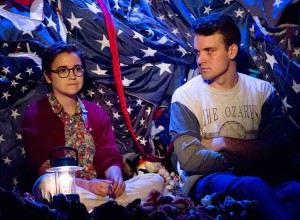Hoarding is a jumping-off point for Jay Stull’s interesting but unfocused drama, The Capables. The dire medical phenomenon has been the subject of reality television, but it has rarely been used dramatically: its most notable appearance was in Richard Greenberg’s 2002 play The Dazzle, about the real-life Collyer brothers in 1947.
Now that the disorder is widely known, however, it is bound to crop up more often, and Stull’s first play employs it primarily for comic effect. The disease, though given astonishing visual presence by George Hoffmann and Greg Kozatek’s extraordinary set, which appears to be the result of mating a toy drive with a flea market, is ultimately just window dressing — and inevitably more orderly than the real thing — for the personal conflicts of the family of the title.
Those conflicts spill over to encompass the crew of the reality TV show that is invited into the home of Anna Capable (Dale Soules) by her daughter, Jessy. To help Anna clear out the family home, Jessy has persuaded her reticent, fundamentalist Christian mother to unburden herself on a broadcast. Part of Jessy’s worry is the near-blindness of her father, Jonah, a fan of classical solo piano music. Inexplicably, director Stefanie Abel Horowitz has him waving his arms as if directing the music in his imagination, apparently unaware that solo piano recitals do not involve conductors.
It’s surely Stull’s bad luck that a razor-sharp satire on reality TV, Good Television, premiered at the Atlantic just a few weeks ago, with several striking similarities to The Capables, including a ruthless producer and an obsession with entertainment over human needs. Here the TV producer is David (Charles Browning), a hard-driving team leader who wants “authentic and spontaneous displays of emotion” to fuel his ratings. Among his assistants is a cameraman, Tommy, a dryly humorous, easygoing participant played by Micah Stock with a slight goofiness and reassuring demeanor. Those qualities help him in a budding romance with Jessy (inhabited with deceptive verisimilitude by cross-dressing performer Katie, aka Jay, Eisenberg).
Stull has a gift for writing sarcasm and arguments: disputes over the use of the word “retarded” and riffs on McDonald’s food choices produce some good comic moments. But the horrors of hoarding are sidelined in favor of the unscrupulous behavior of reality TV; a family mystery the Capables are hiding; and the liaison between Jessy and Tommy.
Fresh off her performance in Hands on a Hardbody on Broadway, Soules displays another expert Southern accent (the setting is Virginia). She is by turns blustering and proud, overbearing and condescending, and when the therapist from the show (Jessie Barr) tries and fails to persuade her to discard items, it’s one of the comic high points of the evening. But she also reveals a cruel streak.
Amid the strands of his plot, Stull has also stuck a peculiar flashback, in which young Anna and Jonah meet. Young Anna is portrayed by an effective Dana Berger, crying and cursing from some he-done-her-wrong interaction. Approached by a concerned young Jonah, her hard-edged, scowling Anna insults and baits him, and the scene drags on past the turning point when Anna, finally playing nice, could have earned some sympathy. But Max Woertendyke’s Jonah — confident, easygoing and sympathetic — is a gem. He conveys an innate kindness in the character that puts over an unlikely plot twist, and Stull’s ear for dialogue helps, as in Max’s description of Anna: “You got a serious hatred for the innocent and what most would call devotion or love you describe it like the plague, like it something shameful.” Still, the bit of back story doesn’t have a payoff sufficient for the time it takes up.
Also too lengthy by far is the opening scene of Act II, when Tommy and Jessy take a trip out to the woods, and Tommy begins to reassure Jessy that although she hardly knows him, he won’t rape her. It’s the comedy of discomfort that’s fashionable today, and although Stock plays it deftly, the pace dwindles to a standstill; the play needs pruning by Stull and/or Horowitz.
Ultimately, the playwright ties up the knots of his plot with a finale that Mark Twain would call a “stretcher.” There is a good deal of talent here, obviously attracted by the promise of the script. But Stull's nascent talent needs stronger directorial focus and more discipline to help it grow.



